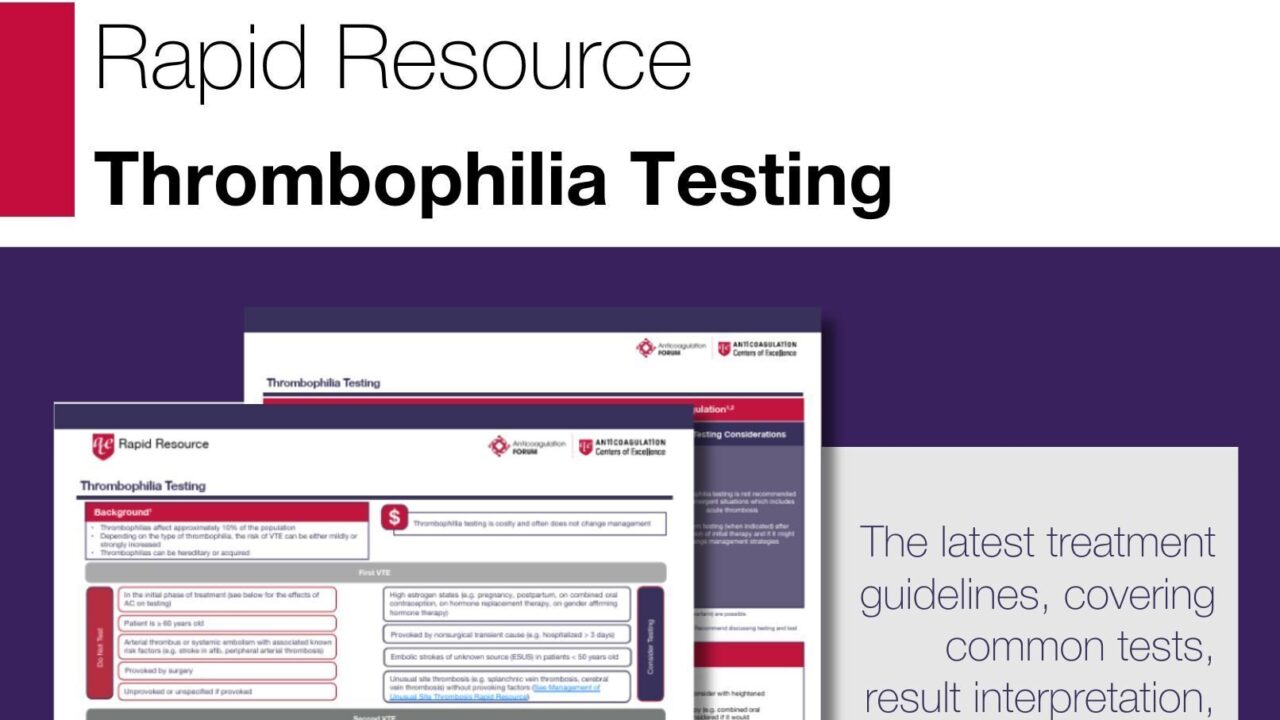
Anticoagulation Forum/X
Jun 2, 2025, 08:35
Refining Thrombophilia Testing: New ACE Rapid Resource Offers Practical Guidance for Clinicians – Anticoagulation Forum
The Anticoagulation Forum has released a new ACE Rapid Resource shared on X, offering concise, evidence-based guidance on thrombophilia testing, built on the most current clinical guidelines. This resource supports clinicians across a range of scenarios—from determining the appropriateness of testing to accurately interpreting results.
“Key features include:
Indications for Testing: Defines clinical contexts where thrombophilia testing is justified, helping to prevent overuse and reduce diagnostic errors.
Interpretation Framework: Offers expert-driven explanations on how to interpret test results in the presence of confounding factors such as acute illness, medications, pregnancy, or hormonal therapy.
Clinical Application: Equips healthcare providers with actionable insights to improve diagnostic accuracy and enhance patient outcomes in suspected thrombophilia.
This resource is a collaboration led by Greg Hadlock, PharmD, PhD, with clinical input from Jean Connors, MD, and an expert panel, and is part of a growing library of high-quality tools offered by the Anticoagulation Forum.”
Access the full resource on ACE Rapid Resource – Thrombophilia Testing․
Thrombophilia Testing: Key Insights from the ACE Rapid Resource
The Anticoagulation Forum’s ACE Rapid Resource offers a streamlined, evidence-based summary to guide clinicians on when and how to perform thrombophilia testing. It emphasizes:
- Appropriate indications to avoid unnecessary testing and misinterpretation.
- Result interpretation in the context of confounding factors such as acute illness, medications, and pregnancy.
- Clinical integration to support accurate diagnosis and optimize patient outcomes.
- This resource reflects current best practices and is intended to enhance decision-making in complex thrombotic risk assessments.
Discover the latest expert insights in Hemostasis Today.
-
Jan 22, 2026, 15:36We Must Roll Up Our Sleeves And Help: José Antonio García Erce on Plasma Donation
-
Jan 22, 2026, 15:25Nita Radhakrishnan on Challenges In Congenital Afibrinogenemia
-
Jan 22, 2026, 15:10Jin Q Gives a Summary of 2025’s Most Impactful Cell and Gene Therapy Milestones
-
Jan 22, 2026, 14:57Nirav Dhanesha on CD14 Acting As A Functional Driver of DVT
-
Jan 22, 2026, 11:41Jamilla Goedegebuur and Colleagues on VTE Management in Case of PAD
-
Jan 22, 2026, 11:28Abdulrahman Katib on API-CAT Trial’s Evaluation of Apixaban Dosing
-
Jan 22, 2026, 11:19Bruno Odisio: Ablation Margins Are Software-Dependent
-
Jan 22, 2026, 10:38Pedro Perez: The VTE Market Is Clearly Entering Its Next Phase
-
Jan 22, 2026, 10:29Marvin Garcia Reyes Presents a Case of Aorto-Visceral and Aorto-Iliac Thrombosis
